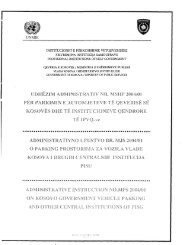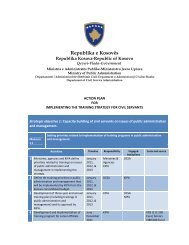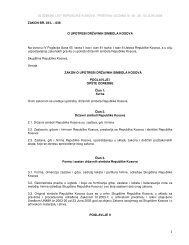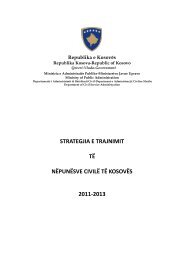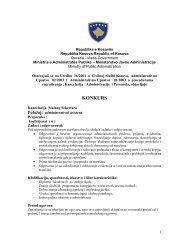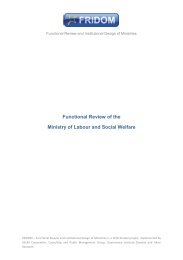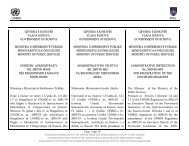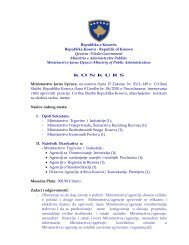Download
Download
Download
Create successful ePaper yourself
Turn your PDF publications into a flip-book with our unique Google optimized e-Paper software.
Hospital prepares its own budget and sends it to MOH; bulk of the budget is salaries which are<br />
fixed due to government wide caps; consulted on proposed budget during the budget process<br />
managed by the Budget Commission of the MOH<br />
Hospital executes the budget; does not request many changes as virements are difficult and limited<br />
in scope<br />
MOH purchases the drugs so a large input to services is not procured by hospital<br />
Hospital hires staff except executive director; can fire but procedures are difficult; limited potential<br />
for promotion except into formal positions in structure; no potential to reward performance; all staff<br />
are civil servants (this will change soon under the changes to the Civil Service Law)<br />
Do internal reporting during the year but no formal in year reporting to MOH on activity data;<br />
prepare budget execution report which is submitted to MOH<br />
Finances- have own bank subaccount in Treasury system; do not retain fees and charges which<br />
are subject to an MOU between MOF and MOH and only 51% revenue earned in health sector is<br />
to be returned to MOH in 2009<br />
Monitoring- some internal audit type monitoring on procurement<br />
The World Bank report on health financing noted that: 12<br />
Health facility managers have little authority over spending, staff levels, staff selection and<br />
performance, and capital; they are unable to take stpes that would improve efficiency of care, for<br />
example, throught strategic staffing or pharmaceutical management. Hospitals are manged<br />
centrally by bureaucratic rules rather than on the basis of efficinet operations.<br />
The formal accountability framework currently in place for the hospitals, the National Institute of Public<br />
Health and other institutions in the health sector is not designed for an institution with some autonomy, as it<br />
lacks features commonly associated with these institutions such as: a governance board; an ex ante plan<br />
of performance linked to the finances that is treated as an accountability document; ex post reporting,<br />
monitoring and external auditing of this; and agreements on services to be produced with funders of<br />
services. These agencies lack internal management functions including financial management and full HR<br />
management functions. Instead they have limited decision rights with regard to HR and finances and<br />
under-developed management capabilities to plan, manage and monitor services, including a serious lack<br />
of management information. Considerable work would need to be undertaken to develop the legal<br />
governance and accountability framework and to put it into operation.<br />
As noted in the Whole of Government Review, the Government could consider an agency law to provide a<br />
robust accountability framework for agencies that are suitable to be moved out from the usual ministry-style<br />
arrangements. The Government would also need to classify the entities into groups that are suitable to be<br />
agencies and those that are not. Some may be commercial State Owned Entities (SOEs) regulated by<br />
private commercial laws and sometimes by a SOE law. Some might be better as a department under a<br />
ministry. Others might be suited to be agencies with varying degrees of freedom, possibly expressed in the<br />
form of requirements tailored to certain classes:<br />
Those that must implement government policies (e.g., suppliers of services like health services,<br />
research council, etc)<br />
Those with independence from government policy and responsibilities under law (e.g., Competition<br />
Commission, Securities Commission, etc)<br />
Both agencies can have similar basic accountability requirements, but the degree of independence can be<br />
reflected in the law through defining the requirement or not to follow government policy. Ministers can be<br />
required to make their directions transparent, by tabling them in parliament. Note that the class of agencies<br />
with greater independence discussed here must not be confused with the independent agencies under the<br />
Constitution which are a very special class of institutions with special protections. The health sector<br />
institutions should not fall into this class of constitutionally independent agencies for the reasons discussed<br />
in Appendix G.<br />
The basic accountability framework would need to consider the governance arrangements, powers in<br />
relation to the use of resources, reporting line, ex ante specification of performance and finances, ex post<br />
12 Ibid, page 11. See also the draft Master Plan page 129 which discussed the lack of flexibility for hospital managers to use inputs<br />
in an efficient way.<br />
21



